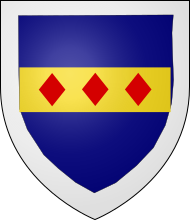
Clan Campbell is a Highland Scottish clan, historically one of the largest and most powerful of the Highland clans. The Clan Campbell lands are in Argyll and within their lands lies Ben Cruachan. The chief of the clan became Earl of Argyll and later Duke of Argyll.

Lord Lovat is a title of the rank Lord of Parliament in the Peerage of Scotland. It was created in 1458 for Hugh Fraser by summoning him to the Scottish Parliament as Lord Fraser of Lovat, although the holder is referred to simply as Lord Lovat.

Clan Fergusson is a Scottish clan. Known as the Sons of Fergus they have spread across Scotland from as far as Ross-shire in the north to Dumfriesshire in the south.

Clan Kennedy is a Scottish clan of the Scottish Lowlands.
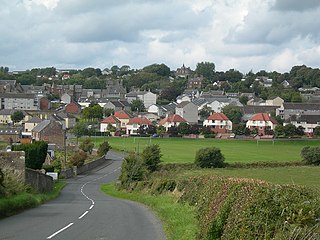
Maybole is a town and former burgh of barony and police burgh in South Ayrshire, Scotland. It had an estimated population of 4,580 in 2020. It is situated 9 miles (14 km) south of Ayr and 50 miles (80 km) southwest of Glasgow by the Glasgow and South Western Railway. The town is bypassed by the A77.

Clan Shaw is a Highland Scottish clan and is a member of the Chattan Confederation.

Clan Farquharson is a Highland Scottish clan based at Invercauld and Braemar, Aberdeenshire, and is a member of the Chattan Confederation.

Clan Gunn is a Highland Scottish clan associated with lands in northeastern Scotland, including Caithness, Sutherland and, arguably, the Orkney Isles. Clan Gunn is one of the oldest Scottish Clans, being descended from the Norse Jarls of Orkney and the Pictish Mormaers of Caithness.
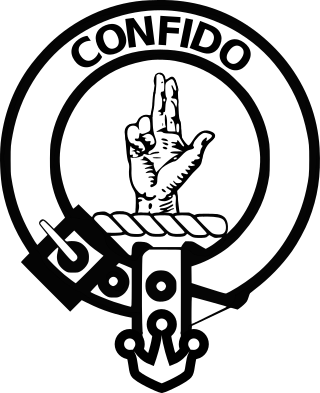
Clan Boyd is a Scottish clan of the Scottish Lowlands and is recognized as such by the Lord Lyon King of Arms.

Clan Cathcart is a Lowland Scottish clan.

Clan Cunningham is a Scottish clan. The traditional origins of the clan are placed in the 12th century. However, the first contemporary record of the clan chiefs is in the thirteenth century. The chiefs of the Clan Cunningham supported Robert the Bruce during the Wars of Scottish Independence. In the 15th and 16th centuries, the Clan Cunningham feuded with the Clan Montgomery. Historically, the chief of Clan Cunningham held the title of Earl of Glencairn. However, in modern times the chief of the clan is Cunningham of Corsehill. On 18 December 2013, Sir John Christopher Foggo Montgomery Cunninghame, Baronet of Corsehill, was recognized by Lord Lyon as Clan Chief after the chiefship had been vacant for over 200 years.
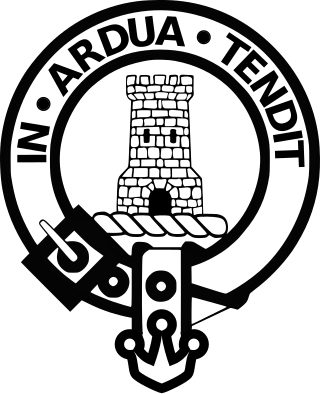
The Clan Malcolm, also known as the Clan MacCallum, is a Highland Scottish clan. The Clan MacCallum may have originally been a separate clan until the 18th century, when the chief of the Clan MacCallum adopted the name Malcolm after inheriting the Malcolm estate, and the two clans were drawn together under the same chief.

Clan MacAulay, also spelt Macaulay or Macauley is a Scottish clan. The clan was historically centred on the lands of Ardincaple, which are today consumed by the little village of Rhu and burgh of Helensburgh in Argyll and Bute. The MacAulays of Ardincaple were located mainly in the traditional county of Dunbartonshire, which straddles the "Highland Line" between the Scottish Highlands and Lowlands. Clan MacAulay has been considered a "Highland clan" by writers and has been linked by various historians to the original Earls of Lennox and in later times to Clan Gregor. The MacAulays of Ardincaple, like Clan Gregor and several other clans, have traditionally been considered one of the seven clans which make up Siol Alpin. This group of clans were said to have claimed descent from Cináed mac Ailpín, King of the Picts, from whom later kings of Scotland traced their descent. The chiefs of Clan MacAulay were styled Laird of Ardincaple.

Clan Crawford is a Scottish clan of the Scottish Lowlands. The clan is of Scandinavian and Anglo-Saxon origin. There was in the early 18th century a mistaken belief that the clan had Norman origins. While historically recognised as a clan by the Court of the Lord Lyon, it is now an armigerous clan as it no longer has a chief. The last chief was Hugh Ronald George Craufurd, who sold his land and moved to Canada in 1904. He died in Calgary in 1942, leaving no male heirs.

Clan Schaw is a Lowland Scottish clan. Clan Schaw does not have a chief recognised by the Lord Lyon King of Arms, therefore the clan has no standing under Scots Law. Clan Schaw is an armigerous clan, meaning that it had at one time a chief who possessed the chiefly arms, however no one at present is in possession of such arms.
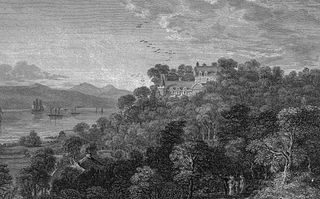
Skelmorlie Castle stands on the eastern shore of the Firth of Clyde, Scotland, at the north-western corner of the county of Ayrshire. The structure dates from 1502, and was formerly the seat and stronghold of the Montgomery Clan. The modern village of Skelmorlie lies to the north of the castle.

Dunduff Castle is a restored stair-tower in South Ayrshire, Scotland, built on the hillside of Brown Carrick Hills above the Drumbane Burn, and overlooking the sea above the village of Dunure.

Monkcastle, Monk Castle sometimes known as Old Monkcastle formed a small estate in the Parish of Kilwinning, North Ayrshire lying between Kilwinning and Dalry on the A737. The property was originally held by the Tironensian monks of Kilwinning Abbey and was probably the site of the abbot's country retreat. The 17th-century Monkcastle is a category B listed ruin, although it has been consolidated and stands next to a private house, constructed from the converted old home farm buildings. The 19th-century mansion of Monkcastle House is nearby, and is also category B listed. The castle may have been used as a dower house or retreat.

Kerse Castle or Carse Castle is a ruined fortification once held by the Craufurd Clan, situated in the Parish of Dalrymple, East Ayrshire, Scotland.
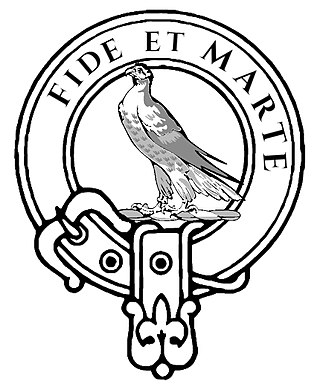
Clan Ralston is a Scottish clan. The clan is recognized as such by the Court of the Lord Lyon, but as it does not currently have a chief recognized by the Lord Lyon King of Arms it is considered an Armigerous clan.
